

 VESPERS ON THE FEAST OF
VESPERS ON THE FEAST OF
THE CONVERSION OF ST. PAUL
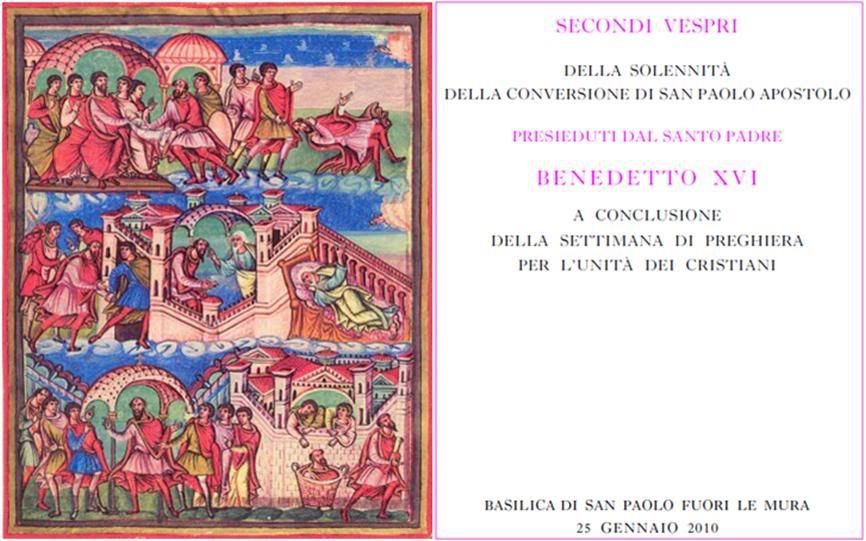 Libretto cover: From the Bible of St. Paul, IX cent., Abbey of St. Paul outside the Walls.
Libretto cover: From the Bible of St. Paul, IX cent., Abbey of St. Paul outside the Walls.
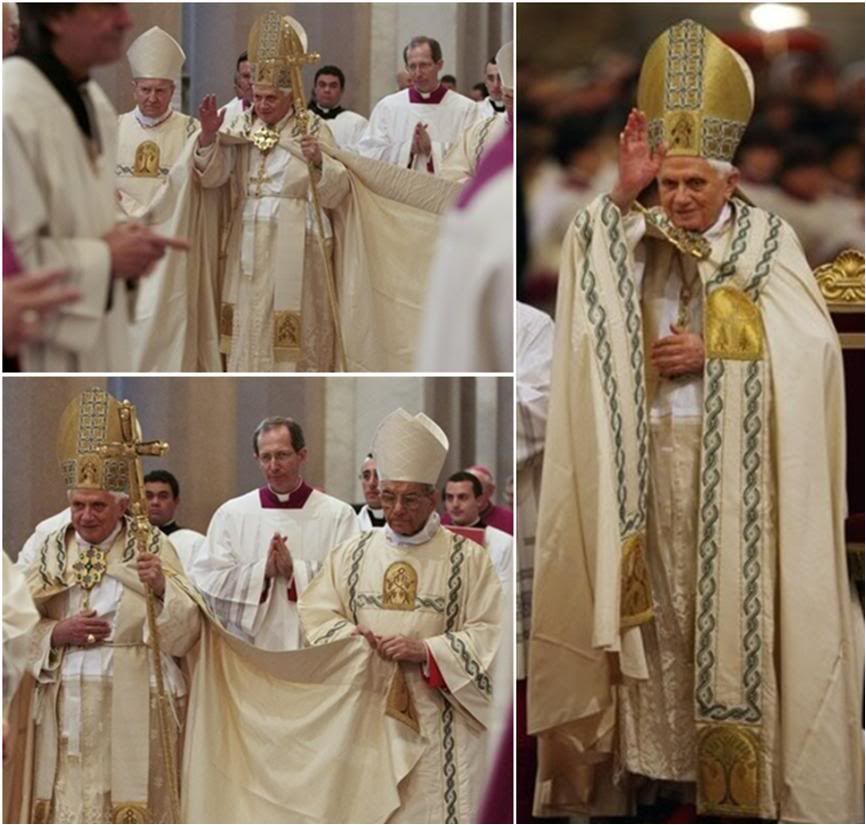
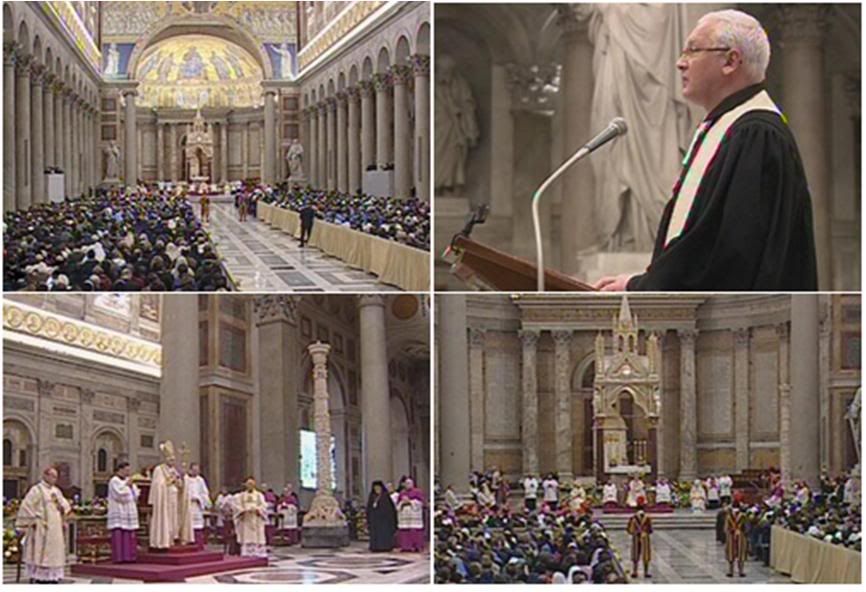 Pope ends Week of Prayer for Christian Unity
Pope ends Week of Prayer for Christian Unity
with renewed call for new evangelization

January 25, 2010
Pope Benedict XVI presided over Vespers this evening marking the Feast of the Conversion of St Paul in the ancient papal Basilica of St Paul’s Outside-the-walls.
The Holy Father left the Vatican at sundown, crossing the Tiber and travelling by motorcade beyond the ancient Roman walls to preside at the ceremony.
There he was joined by the Archbishop of Canterbury’s representative to Rome Rev. Dr. David Richardson, the Orthodox Ecumenical Patriarchate’s representative to Italy, Metropolitan Gennadios, as well as delegations from Rome’s other Christian communities.
Together they prayed above the tomb of the Apostle to the Gentiles marking the end of the Week of Prayer for Christian Unity.
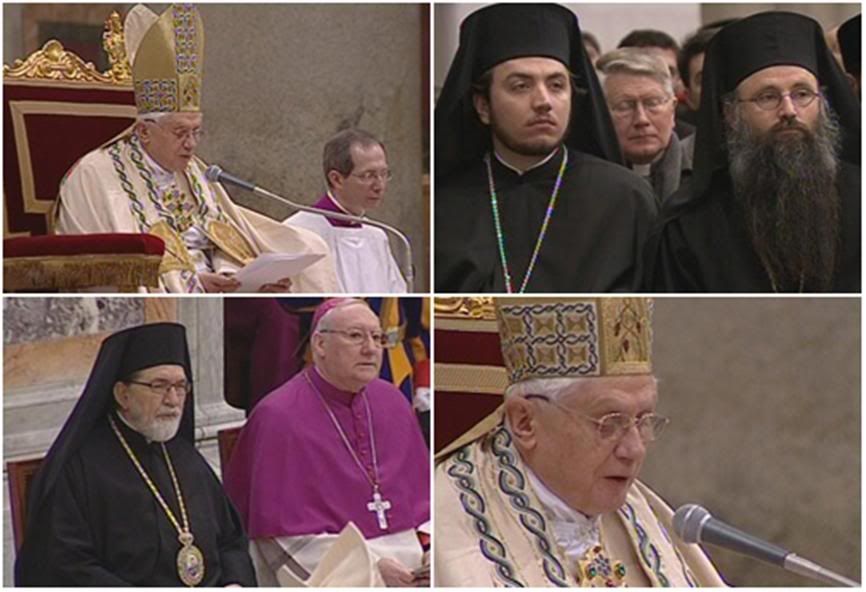
In his homily, Pope Benedict reiterated that “Unity is a gift of God and that it is the mission of all Christians to strive to be one".
He said "the force that promotes unity and mission flows from our fruitful and exciting encounter with the Risen Lord”, as happened to St. Paul on the road to Damascus.
The Pope also spoke of the one hundredth anniversary of the Missionary Conference of Edinburgh in Scotland, which is seen by many as a defining event for the birth of the modern ecumenical movement.
He said “a century later, the intuition of those brave pioneers is still relevant, in a world marked by religious indifference, and even by a growing aversion to the Christian faith”.
Pope Benedict said “Christians are called to offer a common witness to address the increasingly complex challenges of our time, like secularization and indifference, relativism, hedonism, the delicate ethical issues concerning the beginning and the end of life, the limits of science and technology, dialogue with other religious traditions”.
The Pope said also now Christians face the additional challenges of “the preservation of creation, the promotion of the common good and peace, defence of the centrality of the human person, commitment to overcome the miseries of our time, such hunger, poverty, illiteracy, the unequal distribution of goods”.
Pope Benedict said that differences between the Christian Churches remain but he added that “hopefully they can be overcome through prayer and dialogue”.
Looking forward to centenary celebrations of the Edinburgh Conference in June in Scotland, The Pope concluded by calling for “a new, intense work of evangelization, not only among people who have never known the Gospel, but also among people for whom Christianity is part of their history”.
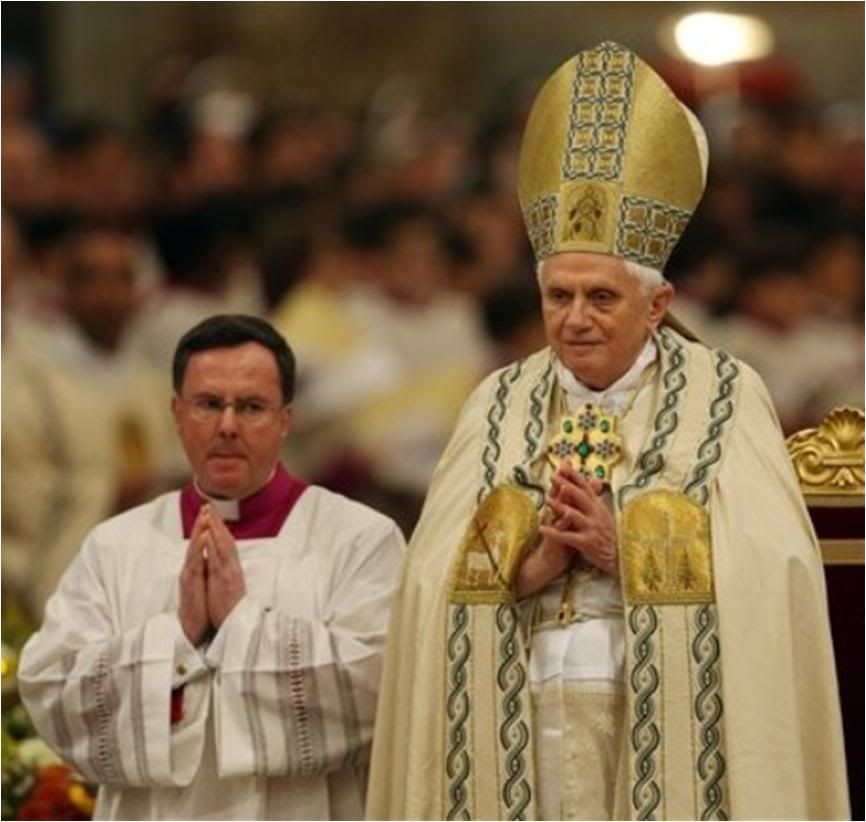
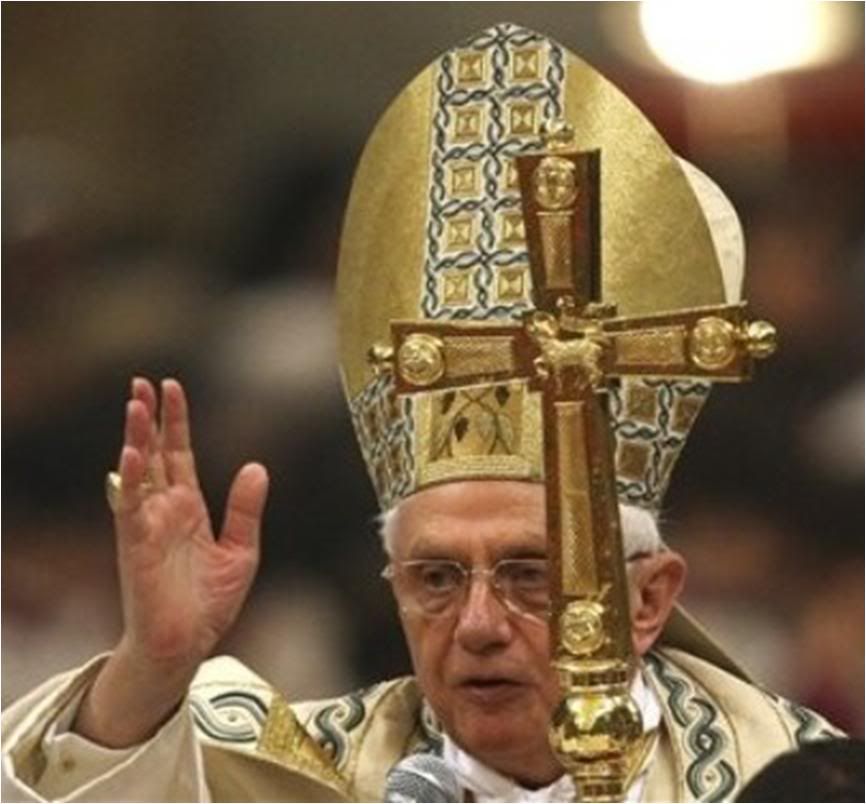 About the celebration
Translated from Notes by
About the celebration
Translated from Notes by

The liturgical celebration of the Conversion of St. Paul highlights the extraordinary power of the grace of God, which is super-abundant where sin is abundant.
The turning point in the life of the apostle happened on the road to Damascus, where the Risen Christ appeared to him, asking, "Saul, Saul why do you persecute me?"
The celebration, already current in Italy as early as the eighth century, entered the Roman calendar of feasts towards the end of the tenth century, and now concludes, very significantly, the Week of Prayer for Christian Unity, reminding us that there is no true ecumenism without conversion (cf. Vatican Council, Decree of ecumenism
Unitatis redintegratio, 7).
This year, the theme for reflection and prayer is that of testimony. That is why the Biblical text adopted was the entire Chapter 24 of the Gospel of St. Luke, and the motto for the Week of Prayer was "You are my witnesses to all this" (Lk 24,28).
Vespers was celebrated in the usual manner. This year's program is as follows:
- Greeting by Cardinal Walter Kasper, president of the Pontifical Council for Promoting Christian Unity
- Reading of the Psalmic prayers:
o His Eminence, Metropolitan Gennadios, Orthodox Archbishop of Italy and Malta, and Exarch for Southern Europe
of the Ecumenical Patriarchate
o Rev. Canon David Richardson – Representative of the Archbishop of Canterbury to the Holy See and
director of Rome's Anglican Center
- Biblical Readings:
o Most Rev. Archimandrite Aren Shaheenian. Rector of the Milan and Rome Communities, Apostolic Armenian
Church in Italy
o Rev. Pastor Holger Milkau, Dean of the Evangelical Lutheran
Church in Italy
- Reading of Intercessions
Scholars of the Catholic committee for cultural collaboration, Pontifical Council for Promoting
Christian Unity
- Readinga:
Besides the usual reading for today's Vespers, a passage from Chapter 24 of Luke's Gospel was also read,
in keeping with this year's Biblical theme.
Assisting the Holy Father as Cardinal Deacons were Cardinal Andrea Cordero Lanza di Montezemolo, emeritus
Arch-Priest of St. Paul's Basilica, and Cardinal Giovanni Coppa.
Altar servers were students of the Benedictine Abbey at the Basilica.
Choral music was provided by the Sistine Chapel Choir, and the choir of the Benedictine monks of the Abbey.
At the singing of the Magnificat, the tomb of the Apostle Paul was incensed, along with the Crucifix, the Altar, the Holy Father and the assembly.
Pauses for silence after each Psalm and after the Holy Father's homily are meant to underscore the dimension of prayerful meditation as an integral part of the liturgical celebration.
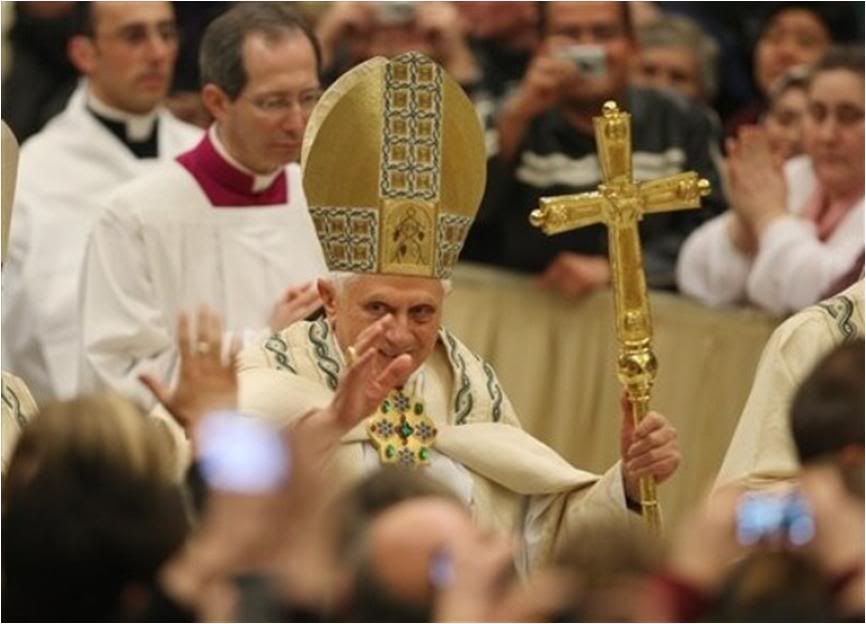 Here is a translation of the Holy Father's homily at Vespers this evening:
Here is a translation of the Holy Father's homily at Vespers this evening:
Dear brothers and sisters,
Gathered together in this fraternal liturgical assembly, on the Feast of the Conversion of the Apostle Paul, we conclude today the Week of Prayer for Christian Unity.
I greet all of you affectionately, especially Cardinal Walter Kasper, president of the Pontifical Council for Promoting Christian Unity; and the Arch-Priest of the Basilica, Mons. Francesco Monterisi, with the Abbot and the community of monks, who are our hosts.
I also address my heartfelt thoughts to the cardinals present, tne bishops, and all the representatives of the Churches and ecclesial communities in the city who are here today.
Not too many months have passed since the conclusion of the Year dedicated to St. Paul, which offered us the opportunity to look deeper into his extraordinary work in preaching the Gospel, and, as the theme of the Week of Prayer for Christian Unity reminds us, "You are witnesses of these things" (Lk 24,48) - of our call to be missionaries of the Gospel.
Paul, although he kept an intense memory of his own past as a persecutor of Christians, did not hesitate to call himself an Apostle. The basis for such a title was, for him, his encounter with the Risen Christ on the road to Damascus, which became the start of tireless missionary activity, in which he would spend his every energy to announce to all peoples the Christ whom he had personally met.
Thus Paul, from being a persecutor of the Church, would himself become a victim of persecution because of the Gospel to which he bore witness.
He writes in the Second Letter to the Corinthians: "Five times at the hands of the Jews I received forty lashes minus one. Three times I was beaten with rods, once I was stoned...; on frequent journeys, in dangers from rivers, dangers from robbers, dangers from my own race, dangers from Gentiles, dangers in the city, dangers in the wilderness, dangers at sea, dangers among false brothers; in toil and hardship, through many sleepless nights, through hunger and thirst, through frequent fastings, through cold and exposure. And apart from these things, there is the daily pressure upon me of my anxiety for all the churches" (2 Cor 11,24-28).
Paul's testimony would reach its peak in his martyrdom, when not far from here, he would prove his faith in Christ who conquers death.
The dynamic in the experience of Paul is the same that we find in the pages of the Gospel we just heard. The disciples of Emmaus, after having recognized the Risen Lord, went back to Jerusalem and found the Eleven gathered together with the others.
The Risen Christ appeared to them, comforted them, won over their fears and doubts, ate a meal with them and opened their hearts to the intelligence of the Scriptures, pointing out what should happen and what would become the nucleus of the Christian announcement.
Jesus affirmed: "Thus it is written that the Messiah would suffer and rise from the dead on the third day and that repentance, for the forgiveness of sins, would be preached in his name to all the nations, beginning from Jerusalem" (Lk 24,46-47).
These are the events that his disciples of the first hour, first of all, and then the followers of Christ in every time and every place, would bear witness to.
It is important, however, to underscore that this testimony, then as now, comes from an encounter with the Risen One, that it is nourished by a constant relation with him, and inspired by profound love for him.
Only he who has experienced Christ present and living - "Look at my hands and my feet, that it is I myself" (Lk 24,39) - sits at table with him, listens to him with ardent heart, can be his witness.
For this, Jesus promised his disciples and each of us powerful assistance from on high, a new presence, that of the Holy Spirit, a gift of the Risen Christ, who guides us to the whole truth: "And (behold) I am sending the promise of my Father upon you" (Lk 24,49), he tells the Eleven and us.
The Eleven would give their whole life to announce the good news of the death and resurrection of the Lord, and almost all of them would seal their testimony with the blood of martyrdom, the fertile seed that has produced such an abundant harvest.
The choice of the theme for the Week of Prayer for Christian Unity this year - the call for a common testimony to the Risen Christ according to the mandate that he entrusted to his disciples - is linked to the observance of the 100th anniversary of the Missionary Conference of Edinburgh, in Scotland, which is considered by many to be a decisive event for the birth of the modern ecumenical movement.
In the summer of 1910, in the Scottish capital, more than a thousand missionaries met, belonging to different branches of Protestantism and Anglicanism, with an Orthodox host, to reflect together on the necessity of reaching unity in order to credibly announce the Gospel of Jesus Christ.
Indeed, it is precisely the desire to announce Christ to others and to bring his message of reconciliation to the world that makes us feel the contradiction of the divisions among Christians. How, in fact, can unbelievers welcome the announcement of the Gospel if Christians, though they call everyone to the same Christ, are in disaccord among themselves?
Moreover, as we know, the Lord himself, at the end of the Lsat Supper, had prayed to the Father for his disciples: "That they may all be one... so that the world may believe" (Jn 17,21).
The communion and the unity of the disciples of Christ is, therefore, a particularly important condition for their testimony to be more credible and effective.
At a distance of one century from the Edinburgh event, the intuition of those courageous precursors is still very actual. In a world marked by religious indifference, and even with growing aversion to the Christian faith, a new intense activity of evangelization is needed, not only among peoples who have never known the Gospel, but even with those among whom Christianity had become widespread and part of their history.
Unfortunately, there is no lack of questions that separate one from the other, which, we hope, can be overcome through prayer and dialog, but there is a central content in the message of Christ that we can all announce together: the fatherhood of God, the victory of Christ over sin and death with his cross and resurrection, trust in the transformative action of the Spirit.
While we are progressing towards full communion, we are called to offer common testimony in the face of the ever more complex challenges of our time, such as secularization and indifference, relativism and hedonism, the sensitive ethical issues regarding the beginning and end of life, the limits of science and technology, dialog with other religious traditions.
There are other areas in which we must henceforth give common witness: safeguarding Creation, promoting the common good and peace, defending the centrality of the human being, commitment to defeat the miseries of our time, such as hunger, indigence, illiteracy, the inequitable distribution of goods and resources.
The commitment for the unity of Christians is not a task only for some, but an accessory activity in the life of the Church. Each is called to give his contribution to achieve those steps that may lead to full communion among all the disciples of Christ, without ever forgetting that it is first of all a gift of God to be invoked constantly.
Indeed, the strength to promote unity and mission flows from the fecund and impassioned encounter with the Risen One, as it was with St. Paul on the road to Damascus, and for the Eleven and other disciples gathered together in Jerusalem.
May the Virgin Mary, Mother of the Church, help to realize as soon as possible the desire of her Son "That they may all be one... so that the world may believe". Amen.
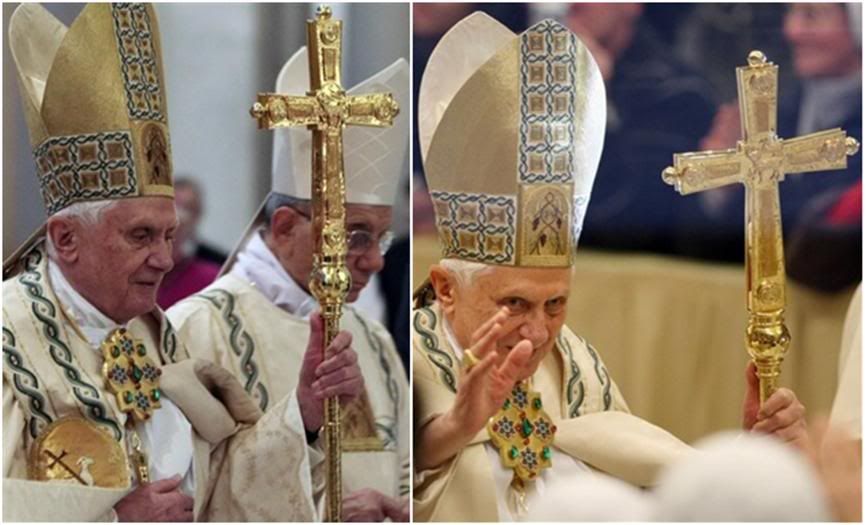
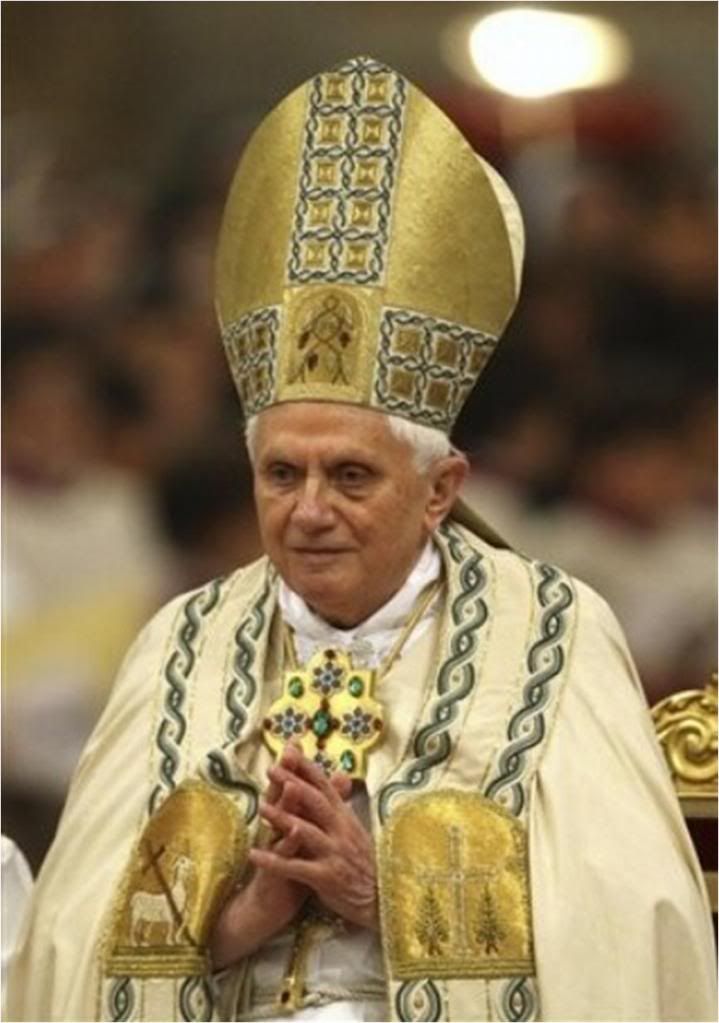
[Modificato da TERESA BENEDETTA 26/01/2010 20:10]